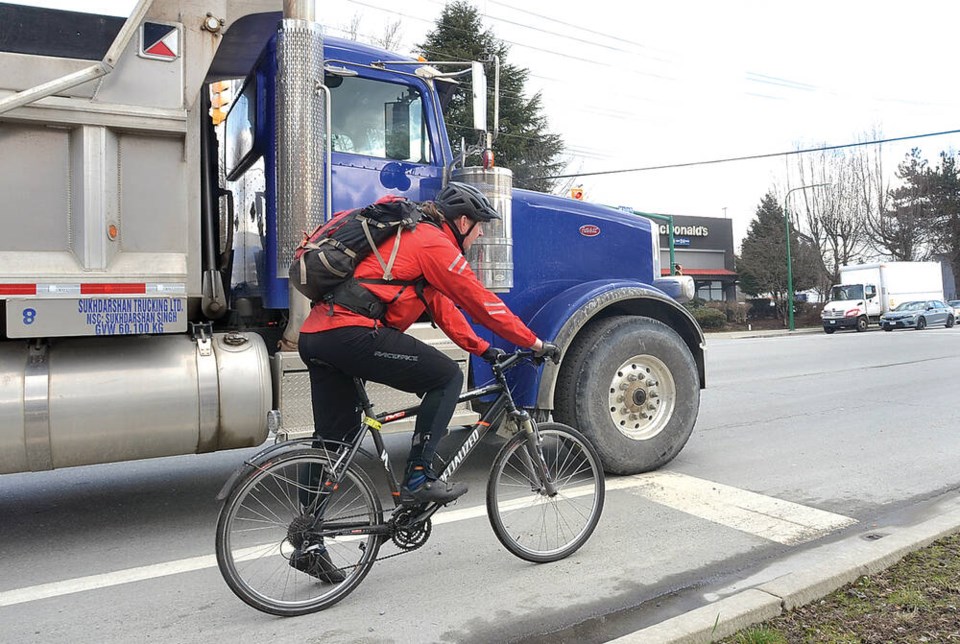New regulations have created a new minimum distance sa国际传媒 drivers must maintain when passing cyclists, the province announced Thursday.
Under changes to sa国际传媒’s Motor Vehicle Act, drivers must maintain a distance of one metre when passing cyclists. On highways with a speed limit above 50 kilometres per hour, that distance increases to 1.5 metres.
“These new regulations will keep people safer on our roads and encourage even more use of active transportation,” Rob Fleming, Minister of Transportation and Infrastructure, said in a statement.
“It’s another step in modernizing our rules to keep up with new technologies that are changing how people are getting around.”
The new minimum distances also apply to other vulnerable road users, which include motorcycles, animal or animal-driven vehicles, electric wheelchairs or mobility scooters, and electric kick scooters.
Other changes to the act create a new class of light e-bikes, which can be operated by people 14 and older as opposed to the previous 16-year-old minimum age.
The light e-bike class is characterized by a lower maximum speed of 25 km/h instead of 32km/h for standard e-bikes. Their motors, meanwhile, must have a maximum power of 250 watts (half that of standard e-bikes), and instead of a throttle assist, can only operate while pedalling.
Under the new vehicle regulations, fully automated self-driving vehicles are prohibited without provincial authorization. Passed in May, the updated act will come into force June 4, 2024.
Province extends e-scooter pilot for four years
The new rules come as the province aims to wrap up a four-year pilot project to test electric scooters across several communities. Pilot allow anyone 16 and older to operate an electric kick scooter without a licence or insurance.
While communities are allowed to set their own bylaws as part of the pilot, overriding provincial rules require scooter riders to use a designated cycling lane or stay as far right as “practicable” on roads with speed limits of 50 km/h or less.
On roads where the speed limit exceeds 50 km/h, electric kick scooters can only use a designated cycling lane.
The sa国际传媒 government says it is using results from the pilot projects to decide how to make permanent regulations around the use of electric kick scooters.
On Friday, the government said it would renew the pilot for another four years across 10 cities — including Chilliwack, Coquitlam, Cranbrook, Kelowna, Langford, Penticton, Richmond, Vancouver, Vernon, Victoria — the District of Saanich and the towns of Oliver and Osoyoos.
Evidence shows most e-assist vehicles could make cycling, mixed-use paths safer
While the results of the pilot have yet to be released, a Metro Vancouver-wide study released by TransLink’s New Mobility Lab in 2022 found almost all electric-assist vehicles move slower than people think and can actually make cycling and mixed-use paths safer.
When mixed with traditional bicycles, e-assist vehicles were found to lower the rate of fast-passing events, and even out overall speeds to around 22 km/h. The exception: sit-down e-scooters, one third of which broke the speed limit. Some of the moped-style scooters reached speeds of up to 45 kilometres per hour.
The study’s lead author, Alexander Bigazzi, a professor in the University of British Columbia’s School of Community and Regional Planning, said at the time that e-assist vehicles have similar speeds, manoeuvrability and equivalent vulnerability to traffic as traditional bicycles.
He therefore suspects e-assist vehicles could manage road traffic just as well as a bicycle, but stopped short of recommending government legalize them on the road beyond e-bikes and an e-scooter pilot program already in place.
First, he said, more work needs to be done analyzing the new vehicles’ stopping distance.



